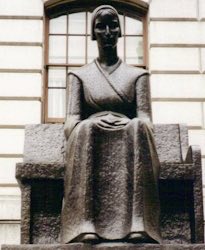Mary Barret Dyer, a martyred Quaker, originally was a faithful Puritan. As such, she and her husband settled in Massachusetts Bay Colony in 1635. However, as a follower of the dissenter Anne Hutchinson, she and her family were banished by Puritan rulers after Hutchinson was convicted and banished for preaching heretical ideas.
Dyer eventually returned to England where she became a protégé of George Fox, the founder of Quakerism. Returning to Boston as a Quaker, she was expelled for preaching Quakerism. Refusing to accept her exile, she returned again and again.
Finally, the rulers of the Massachusetts Bay Colony tried and convicted her of preaching heresy and condemned her to death. Reprieved and expelled, she returned again. Again, she was tried and convicted of violating the statute against preaching Quakerism. This time her sentence was carried out–she was hanged June 1,1660.
When offered her life if she would leave Massachusetts and return no more she said: “Nay, I cannot; for in obedience to the will of the Lord God I came, and in His will I abide faithful to death.”
Gradually, many came to consider her death the death of a martyr. Some claim that she was ahead of her time, searching for a religion that held women to be equal to men. Her hanging hastened the easing of anti-Quaker statutes and began a process that contributed to the move for more religious tolerance in the colonies and would, ultimately, result in freedom of religion and the separation of church and state in the United States of America.

